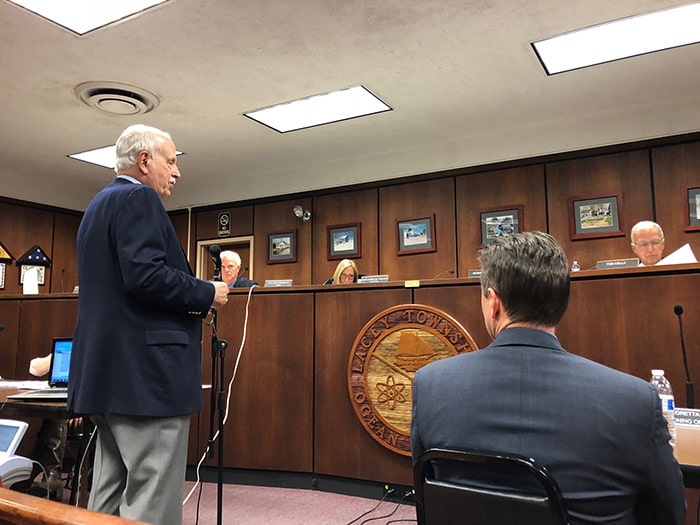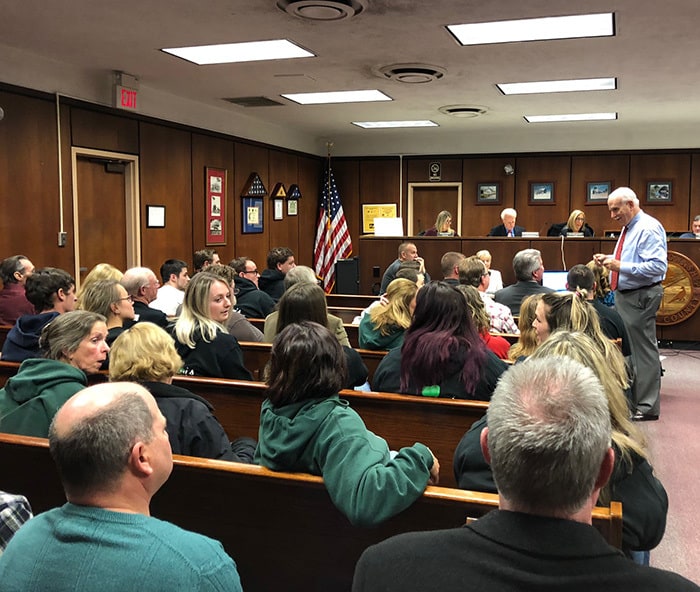
LACEY – It’s official: Caffrey’s Tavern has the OK to rebuild. This news came to raucous cheers and applause from a full crowd of Caffrey’s supporters at the Dec. 12 meeting of the township zoning board.
After nearly two hours of testimony on behalf of Caffrey’s Tavern, the township zoning board reversed its original decision, unanimously granting the restaurant permission to rebuild.
Following the Sept. 5 fire that took out parts of the beloved landmark restaurant, the owners Dan Coleman and Joe DePasquale applied to the township to allow for rebuilding on the site as-is.
On Sept. 21, the township Zoning Officer, Loretta Rule, denied Caffrey’s zoning application based on issues with compliance. According to Rule, the building was not in compliance with code 335-8, which states that no structure can be rebuilt or altered unless it is “in conformity with the yard, lot area and building location regulations designated for the zone in which such building or open space is located.”
Appealing the board on behalf of Caffrey’s owners was Harvey York of Novins, York & Jacobus, a Toms River-based firm, who claimed that Rule’s decision was made with “insufficient information” that considered the location over the structure.
The board eventually agreed that the damage to Caffrey’s building did not exceed “partial destruction,” allowing for the possibility of reconstruction.

York cited another case where “partial destruction” was essential to the fate of a pre-existing, nonconforming building, similar to Caffrey’s. In this 2013 case, Motley v. Borough of Seaside Park Zoning Board of Adjustment, the New Jersey Appellate Division sided with the municipality, claiming that the building exceeded “partial destruction,” therefore rebuilding was not feasible, according to York.
York drew on New Jersey Municipal Land Use Law as well as expert witness to attempt to define what was considered “partial destruction” and whether Caffrey’s exceeded this definition or not.
The township’s hired professional engineer, Scott McConnell, did not have an answer to this question. McConnell inspected the structure on Dec. 4 and provided a report to the township on Dec. 12.
“In my estimation it’s more than really a partial loss,” said McConnell, who defined partial loss as, “maybe a few charred joists.” McConnell’s report stated that the building experienced “substantial destruction,” with approximately two-thirds of the building destroyed by fire. It described the last remaining support structure as one steel, fire-damaged beam.
The issue, as York put it, is that there is no concrete definition of “partial destruction” laid out by New Jersey Municipal Land Use Law. Despite this, Board attorney Stephen Smith read from the book of New Jersey Zoning & Land Use Administration that, “The rule of thumb that has developed in many municipalities, where if the foundation or at least two walls remain, the destruction is only partial.”
Smith emphasized that this rule is not law but has become the standard for many municipalities in terms of deeming “partial destruction.”
What ensued was a series of expert testimony as to whether Caffrey’s exceeded “partial destruction” according to the opinions of a public adjuster, professional engineer, and architect hired to represent Caffrey’s.
Jesse Sipe, a public adjuster with Sipe Adjustment Group, presented pictures of the “good” parts of the structure to the board; the parts of the building that were not damaged. Sipe reported that it was only the rear bar and roof area that was destroyed, the rest of the building is repairable. According to Sipe, a majority of the damage is due to water damage.
Brian Murphy, a professional engineer with FWH Associates, testified that after inspection, he estimated 39.6 percent of the structure was damaged, deeming it a “partial loss.”
Architect Craig Brearley concurred with Sipe’s and Murphy’s testimony, stating that the foundation and footing of the structure remain intact.

When York questioned Dan Coleman, co-owner of the restaurant, during the meeting, it was found that Coleman acquired the township assessor’s assessment of the restaurant following the fire. According to the official report, the building’s value was assessed at $516,540 after the fire. This is a 40 percent reduction from the prior assessment at $869,000, said York.
The board went into caucus to make a final decision on whether to overturn the zoning officer’s original decision, quickly and unanimously deciding to approve Caffrey’s zoning permits.
“We’re very appreciative that the board heard our testimony,” said Coleman. Coleman also noted his disappointment in the money spent on hiring experts for the purpose of regaining their permits, as well as the people put out of work since Sept. 5 for the decision to be made.
“We’re going to get started real soon,” he added.







